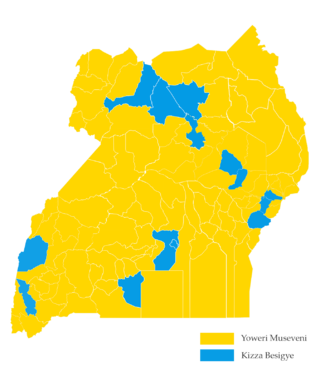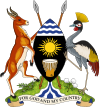
The politics of Uganda occurs in an authoritarian context. Since assuming office in 1986 at the end of the Ugandan civil war, Yoweri Museveni has ruled Uganda as an autocrat. Political parties were banned from 1986 to 2006 in the wake of the 2005 Ugandan multi-party referendum which was won by pro-democracy forces. Since 2006, Museveni has used legal means, patronage, and violence to maintain power.
The history of Uganda comprises the history of the people who inhabited the territory of present-day Uganda before the establishment of the Republic of Uganda, and the history of that country once it was established. Evidence from the Paleolithic era shows humans have inhabited Uganda for at least 50,000 years. The forests of Uganda were gradually cleared for agriculture by people who probably spoke Central Sudanic languages.

Yoweri Kaguta Museveni Tibuhaburwa is a Ugandan politician, military officer and revolutionary who has been the ninth President of Uganda since 1986. His government is considered autocratic. After Museveni lost the election of 1980, he started the Ugandan Bush War which led to the removal of Milton Obote.

The History of Uganda from 1979 to 1986 comprises the history of Uganda since the end of the dictatorship of Idi Amin. This period has seen the second rule of Milton Obote and the presidency of Yoweri Museveni since 1986, in which Ugandan politics have been dominated by the National Resistance Movement.

The National Resistance Movement has been the ruling party in Uganda since 1986.

The Uganda People's Congress is a political party in Uganda.

The Democratic Party is a moderate conservative political party in Uganda led by Norbert Mao. The DP was led by Paul Ssemogerere for 25 years until his retirement in November 2005. John Ssebaana Kizito replaced Ssemogerere, and led the party until February 2010, when Norbert Mao was elected party president.

The Uganda Patriotic Movement (UPM) is a defunct socialist political party in Uganda. It was founded by Yoweri Museveni and was a left-wing splitter group from the Uganda People's Congress (UPC).

Warren Kizza Besigye Kifefe, known as Colonel Dr. Kizza Besigye, is a Ugandan physician, politician, and former military officer in the Uganda People's Defence Force. He served as the president of the Forum for Democratic Change (FDC) political party and was an unsuccessful candidate in Uganda's 2001, 2006, 2011, and 2016 presidential elections, losing all of them to the incumbent, Yoweri Museveni, who has been president of Uganda since 26 January 1986. The results of the 2006 elections were contested in court, and the court found massive rigging and disenfranchisement. Besigye allowed an early internal FDC election for a successor president, which took place on 24 November 2012.

The parliament of Uganda is the country's legislative body. Unicameral, the most significant of the Ugandan parliament's functions is to pass laws that will provide good governance in the country. The government ministers are bound to answer to the people's representatives on the floor of the house. Through the various parliamentary committees, parliament scrutinises government programmes, particularly as outlined in the State of the Nation address by the president. The fiscal issues of the government, such as taxation and loans need the sanction of the parliament, after appropriate debate. Parliament must confirm some Presidential nominations and may force a Minister to resign by passing a motion of censure.

Miria Obote is a Ugandan politician who was first lady of Uganda, and widow of former Prime Minister and President Milton Obote. She was a candidate in the 2006 Ugandan general election.
Akena p'Ojok is a former influential Ugandan politician who held various government positions in the 1980s, including Minister of Power, Posts and Telecommunications. He was a prominent figure of Uganda National Liberation Front/Army that helped remove Idi Amin and was involved in the power struggles that followed.

Presidential elections were held in Uganda on 12 March 2001. The incumbent Yoweri Museveni won 69% of the vote and was elected to a second term. All candidates were independents, as political parties were banned at the time. Voter turnout was 70.3%.

General elections were held in Uganda on 18 February 2016 to elect the President and Parliament. Polling day was declared a national holiday.

In Uganda, the Leader of the Opposition (LOP) is the leader of the largest political party in the Parliament of Uganda that is not in government. The Leader of the Opposition appoints and heads an alternative shadow cabinet whose duty it is to challenge and influence governmental actions and legislation on the floor of Parliament.

The Alliance for National Transformation (ANT), founded on 19 March 2019, is a political party in Uganda.

The National Unity Platform, formerly the National Unity, Reconciliation and Development Party (NURP), is a political party in Uganda led by Robert Kyagulanyi Ssentamu. The NURP was led by Moses Nkonge Kibalama from December 2004 until July 2020. On 14 July 2020, Kyagulanyi assumed leadership of the party and was declared the party flag-bearer for the January 2021 Ugandan presidential elections.

General elections were held in Uganda on 14 January 2021 to elect the President and the Parliament. The Electoral Commission announced Incumbent President Yoweri Museveni, the incumbent ruling since 1986, as the winner with 58.64% of the votes although the U.S. State Department qualified the electoral process as "fundamentally flawed" and Africa Elections Watch said they observed irregularities. The official voter turnout was 57% but is questioned since 409 polling stations have been announced to have 100% voter turnout.
Events in the year 2021 in Uganda.
Linda agnes Auma is a Ugandan politician and legislator, she represents the people of Lira district as woman member of parliament in the parliament of Uganda, which she entered on an independent ticket. Auma is the state minister for Gender and culture and the vice chairperson of the National women council. She is also the former Resident district commissioner (RDC) Of Amuru district.















